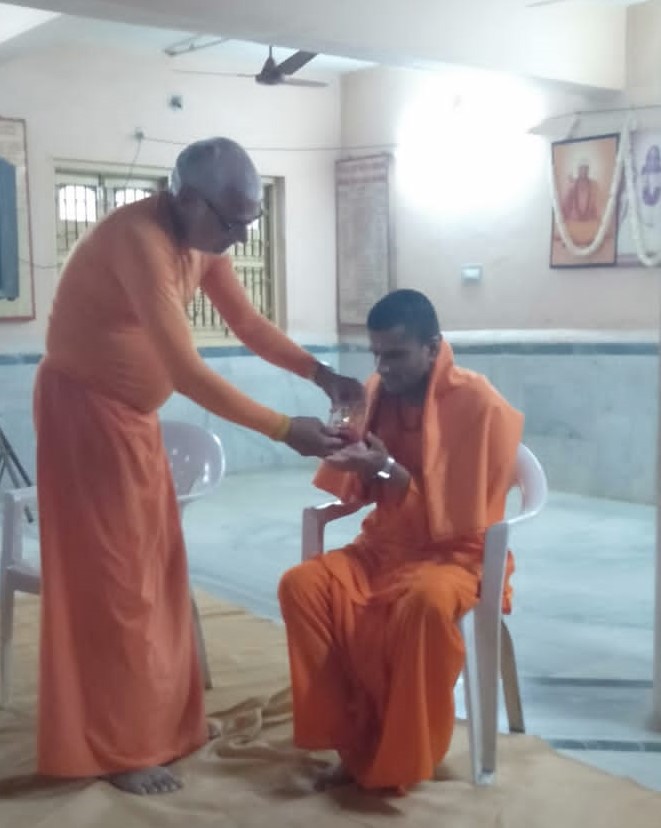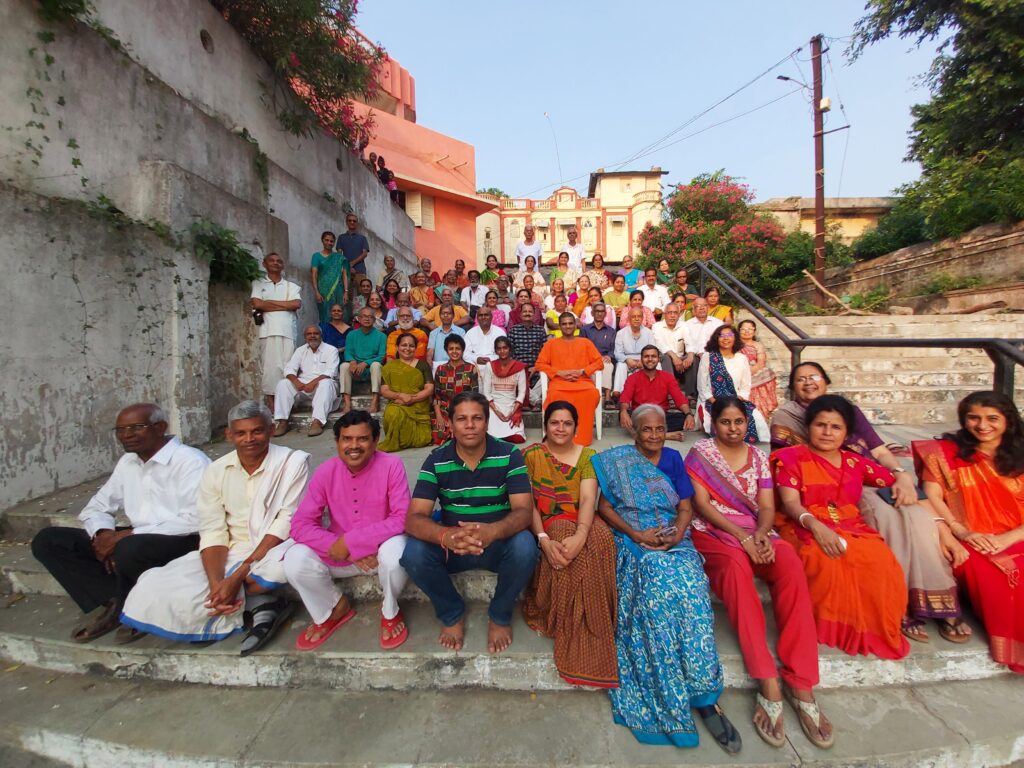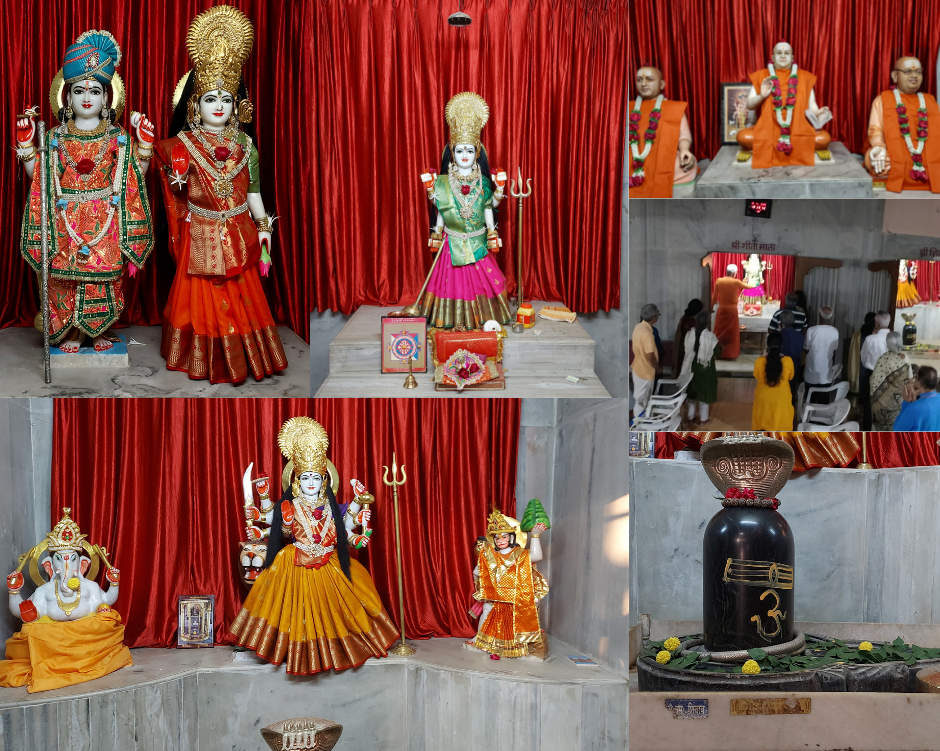July 2022
All spiritual practices are to help us accomplish steady equipoise for meditation.
–Chinmaya
What is the greatest goal of life?
Firm abidance in the Self.
Bhagavan Ramana Maharshi says:
हृत्स्थले मन:स्वस्थता क्रिया भक्तियोगबोधाश्च निश्चितम् ॥
(The purpose of all spiritual practices – Bhakti Yoga, Karma Yoga, Ashtanga Yoga, Jnana Yoga – is to abide in the Self.)
In the language of devotion, abidance in the Self means remembrance of the Lord.
Hence Bhagavatham says:
एतावत् साङ्ख्ययोगाभ्यां स्वधर्मपरिनिष्ठया । जन्मलाभ: परं पुंसां अन्ते नारायणस्मृति: ॥
(The purpose of all Yogas – be it Jnana, Karma or any other Yoga is this – remembrance of the Lord at the time of death. This is the greatest attainment in human life.)
Vinoba Bhave, the spiritual successor of Mahatma Gandhi, and the man behind the Bhoodan Movement, considered his mother as his role model. Here is what he says about his mother:
There is nothing to equal the part my mother played in shaping my mind. I have spent time in the company of many good men, and I have read the books of many great ones, filled with the wisdom of experience. But if I were to put all that in one pan of the scales, and in the other what I learned from my mother of practical devotion, that second pan would carry the greater weight of value.
My mother was a great devotee. She would serve everyone in the house with their food, and finish all her other household work, and then before eating her own meal she would seat herself before the Lord and carry out the ritual of worship, offering the lights and flowers in the customary way, just like everyone else. But the devotion in her heart was revealed when she made her obeisance to the Lord at the end of the puja. Bowing before Lord she would grasp both her ears and pray aloud:
“O Lord of this boundless universe, forgive me my faults,” while tears filled her eyes and ran down her cheeks.
Such tears are not produced at will. They can come only from a heart overflowing with devotion. Of course, it is common for us ordinary folk to shed tears on special occasions, but I have watched her tears flowing every day, at the ordinary daily puja, in a way impossible without a heart filled with devotion. Of all my treasured memories of my mother, this is the most precious.
Mother was an ordinary housewife, busy all day long with her work, but her mind dwelt continually on the Lord. She was in the world, but the world was neither in her mind nor on her lips, and we never heard her utter a harsh word. From the moment she rose in the morning she would be repeating the Name; as she sat grinding the grain she would sing hymns to the Lord. All her songs were songs of worship, and she sang them with wonderful love and devotion. She had a very sweet voice, and she would become completely absorbed in her singing.
I said to her once: “Mother, you must sing a new song every day. It won’t do to have yesterday’s song today or today’s song tomorrow!” So for six months, she sang a new song for me every day, so many did she know. She was from Karnataka where her family still lived, and she knew Kannada songs also, besides Marathi.
Whatever mother was doing, whether bathing or cooking, she would be inwardly absorbed in some devotional chorus or other, so much so that one of the dishes occasionally got salted twice over. She would never eat until everyone else had finished and she had completed her puja. I was usually the first to sit down for the meal, but I paid very little attention to the food. I simply ate whatever was set before me and then went off. Then my father would come and say that there was too much salt in the vegetables.
In the evening mother would tackle me: “Why didn’t you tell me that the vegetables were over-salted?”
“Why didn’t you taste them and find out for yourself?” I would reply.
But that would never have seemed right to her. How could she possibly taste food until she had finished her worship and made her offerings!
Every evening mother would set the milk for curd, invoking the Lord as she did so.
“Where was the need,” I once asked her, “to bring God into the business? This is pure science!”
“Look, my son,” she answered, “of course, we on our part do everything we can, but all the same the curd will only set well by God’s grace.” She knew that there is a place for both human effort and Divine Grace.
Mother insisted, when I was a child, that I must water the tulsi (basil) plant every day. One day after my bath I came straight to the kitchen and sat down for my meal.
“Have you watered the tulsi?” asked Mother.
“No,” I said.
“Then go and do it now. I will only give you your food when it’s done.”
That was her lasting gift to me. She gave me everything – milk to drink, food to eat, and stayed up night after night to care for me when I was sick; but this training in right human conduct was the greatest gift of all.
There was a jackfruit tree in our courtyard at Gagode. I was only a small child then, and as soon as I saw a fruit beginning to grow I would start asking when I could eat it. When at last it was ripe, my mother would cut it down and fill a lot of leaf-cups with segments of the fruit. Then she told me to take these as gifts to every house in the neighbourhood. When they had all been distributed she would seat me at her side and give me some of the sweet segments to eat.
“Vinya,” she would say, “we must first give, and afterwards eat.”
She was teaching me some of the deepest truths of philosophy, but she made it into a little rhyme: Giving is God-like, hoarding is hell.
This teaching of hers made such an impression on me that without it, I must admit, I might never have had the inspiration to start the Bhoodan Movement.
If any of our women neighbours fell ill, mother would go to the house and cook for the family. At such times she would first finish the cooking for our own household and then go to the other house.
“That’s selfish, mother,” I said one day. “You take care of your own children and your own home first, and the other family comes second!”
Mother began to laugh. “That is not true.” She said, “Our food is cooked too soon, so it gets cold. I want those people to have their food fresh and hot, so I go there and cook it at the proper time. That’s not selfish, it’s unselfish!”
When I was little I was afraid of ghosts. Mother explained to me that ghosts would never harass the devotees of God. “But if you feel frightened just take a lantern with you and go on repeating the name of God. Whatever ghosts happen to be there will soon run away.”
If a beggar came to our door mother would never allow him to go away empty-handed. One day a very sturdy-looking beggar came, and my mother gave him alms. I protested. “Mother,” I said, “that man looks perfectly fit. To give to such people is to encourage laziness. Does not the Gita tell us to do charity at the right place at the right time to a worthy person?”
Mother listened, and then said very quietly: “Vinya, who are we to judge who is worthy and who is unworthy! All we can do is to regard everyone who comes to the door as God, and offer what is in our power. Who am I to judge him?”
To this argument of my mother’s, I have not to this day been able to find a convincing reply.
My father often had a needy student living with us in the house. When cold food was left over from a previous meal, mother would eat it herself, and if there was too much for her she would serve some to me. For the student, however, she always served fresh hot food. This went on day after day, and finally, I spoke to her about it.
“Mother,” I said, “you tell us that we ought to regard everyone as equal, but you are still making distinctions yourself. You never give that boy cold food; you always give it to me. You are not treating us as equals, are you?”
Mother answered at once: “Yes, you are right. I do treat you differently from other people. I am attached to you; I am partial to you, because I still look upon you as my son, whereas I look upon that other boy as God in human form. When I can see you too in that way, these distinctions will disappear.”
There is a custom of setting aside a small portion of food at every meal as an offering to God. One day I omitted to do this, and my mother asked if I had forgotten.
“No,” I said, “I have not forgotten, but I’ve been thinking. Five of these portions make about a quarter tola (1 tola=12 grams) of rice, so that in a month of thirty days it adds up to about seven tolas. There are about thirty million Brahmins in India, and that means that in the course of a year about thirty million seers (1 seer=1.25 Kg) of rice go to waste. It’s not right to throw away all that rice when there are so many poor people in the country.”
“All right,” mother replied. “You are a learned fellow and I’ve no doubt your calculations are correct. But my way of reckoning is different. If you put that scrap of rice by the side of your plate, the flies sit on that and not on the food that you are eating. The flies get something to eat. It’s a service to other living creatures.”
I often reflected on the meaning of what she said.
One day I was idly swinging a stick, striking the wooden columns of the veranda. Mother stopped me. “Why are you doing that?” she asked. “They are an image of God, why do you hurt them?”
I stopped at once. In India, the feeling that even a wooden pillar should not be needlessly hurt is in the very air we breathe. This reverence for all the creatures of God is something my mother taught me from my earliest childhood.
As a child, I was often sick and under medical treatment. When my mother gave me the medicine she used to make me recite a Sanskrit verse, and one day I asked her what it meant. She said: “It means, look upon the doctor as God, and upon his medicine as Ganges water.”
“Might it not equally well mean that God is the true healer and Ganges water the true medicine?” I asked.
“Yes,” she said, “that is also a correct interpretation, but one has to be fit for it; for the present, you had better look upon the doctor as God.”
Two alternative lines of thought, and truth in both of them.
Mother was not well-read but she was familiar with the stories of the saints in such books as Bhakti-Vijay. One day I commented, “Saints like these were to be found only in ancient times; there were none such today.”
Mother replied, “Such saints are alive even in our times, but we do not know about them. If there were no saintly spirits to give the world the strength of their austerities, how could it survive?”
That was her faith, and on the basis of that faith, she taught me things that have been of value to me throughout my life.
All her three sons became brahmacharis. “Vinya,” she would say, “a virtuous life as a householder brings salvation to one generation, but the life of brahmacharya at its highest brings salvation to forty-two generations.”
When she was thirty-six years old, at her earnest desire, she and my father took a vow of celibacy, as father himself told me after she had died.
Mother died at the age of forty-two, on 14 October 1915, at the same age as Tukaram, whose devotional hymns she so often read. I was with her when she died, and it seemed to me that she was in great peace.
I had asked her, “Do you feel at peace?”
“Completely at peace,” she had replied. “For one thing, you are grown up, and I have no anxiety either about you or about your brothers, for you will look after them. For another thing, I had the vision of the Lord. As I am leaving the body I feel His constant presence and I feel completely fulfilled.”
Some of my mother’s words have had such an influence on me that I have included them in my book Vichar Pothi (Random Reflections):
“Vinya, don’t ask for big helpings. Remember, small is sweet, much is mischief.”
“Give ear to nothing other than the words of the wise, of God, and of saints.”
O, mother, you have given me what no one else has given. I need no other proof of the immortality of the soul. To this day you are with me; you are an abiding part of my life…
The above are the words of Acharya Vinoba Bhave regarding his mother.
Her life is the greatest proof that performance of even worldly duties with God-centeredness can become an ideal spiritual practice and can lift us to the highest meditation and God-realisation.
O M T A T S A T
Posted in: Sadhana Camp
Leave a Comment (0) →


